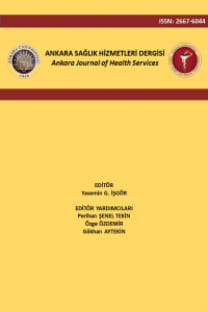Türkiye’deki Hastanelerde Dış Kaynak Kullanımı: Sistematik BirAnaliz
Dış kaynak kullanımı devlet hastanelerinde temel bir strateji haline gelmekte ve son zamanlarda tanınırlığı artmaktadır. Türkiye’de bu trendi oluşturan itici güç, özel sektördeki baskıların ve rekabetin kamu sektörünü daha verimli kılacağı gerçeğine dayanarak Sağlık Bakanlığı tarafından başlatılmıştır. Bu çalışmanın amacı, sistematik analiz yoluyla Türkiye’deki hastanelerde dış kaynak kullanımı konusunda elde edilen farklı araştırma bulgularını karşılaştırmak, bütünleştirmek ve gelecekteki araştırmalara yönelik öneride bulunmaktır. Analizde 2005 ve 2011 yılları arasında yayınlanmış toplam 15 çalışma (8 tez, 7 makale) kapsama alınmıştır. Bu çalışmaların sonuçlarına göre, dış kaynak kullanımının maliyetleri azalttığı, verimliliği ve hizmetlerin kalitesini artırdığı bulunmuştur. Sadece bir çalışmada dış kaynak kullanımının hastane maliyetlerine etkisi hastane kayıtlarına dayalı olarak incelenmiştir. Başka bir çalışmada ise hastane çalışanlarının memnuniyet düzeyi düşük bulunmuştur. Sonuç olarak, Türkiye’deki kamu ve özel hastanelerde dış kaynaklardan yararlanılarak verilen hizmetlerin etkilerini belirleyen objektif kalite, verimlilik ve maliyet indikatörlerine dayalı ampirik araştırmalara gereksinim duyulduğu söylenebilir
Anahtar Kelimeler:
Sistematik analiz, dış kaynak kullanımı, hastane yönetimi
Outsourcing in Turkish Hospitals: A Systematic Review
Outsourcing has become a basis strategy in the public hospitals and has recently grown considerably in popularity. The impetus for this trend was the initiated by the Ministry of Health in Turkey with the fact that private sector pressures and competition would make public sector more efficient. The aim of the study is to compare and integrate different research findings carried out on outsourcing services in the hospitals in Turkey through a systematic review and to make suggestions for future researches. A total of 15 studies (8 dissertations and 7 articles) published between the years 2005 and 2011 were identified for inclusion in the present review. According to the results of these studies, outsourcing have decreased the costs, increased the productivity and the quality of services. In only one study the effect of outsourcing services was examined based on the hospital cost records. In another study the satisfaction level of hospital staff was found low. According to the results, it can be stated that there is a need some empirical research that will determine the effect of outsourcing services based on the indicators of objective quality, productivity and costs, in public and private hospitals in Turkey
Keywords:
Systematic review, outsourcing, hospital management,
___
- Ata, B., Urman, B. 2008. Critical appraisal of systematic reviews. Journal of Turkish Society of
- Obstetric and Gynecology, Vol: 5 Issue: 4 Pages: 233- 240 (in Turkish) Burkholder, N.C. 2006. Outsourcing: the definitive view, applications and ımplications. John Wiley & Suns, Inc.
- Dorthch, W.L. & Davis, L.L.P. 2006. Sponsored material special supplement to health leaders _ http://www.wallerlaw.com.sitemason.com/files/WallerSurvey.pdf.
- Eliot, L.B. 1998. Outsourcing of organizational functions. Decision Line,A News Publication of the Decision Sciences Institute, Volume 29 (4).
- Ergin, S. & Sahin, I. 2001. Contracting out as intermediary outsourcing: a study of the ministry of health of Turkey hospital managers’ evaluation. Hacettepe Journal of Health Administration.
- Foxx, W.K., Bunn, M.D. & Mccay, V. 2009. Outsourcing services in the healthcare sector. Journal of
- Medical Marketing, Vol: 9 Issue: 1 Pages: 41–55. Hatch, M.Jo. 1997. Organization theory: Modern symbolic and postmodern perspectives. Oxford University Press.
- Kakabadse, A. & Kakabadse, N. 2000. Sourcing: New face to economies of scale and the emergence of new organizational forms. Knowledge and Process Management, Vol: 7 Issue: 2, Pages 107-18.
- Kavuncubasi, S. & Yildirim, S. 2010. Hastane ve sağlık kurumları yönetimi. Gözden Geçirilmiş ve Genişletilmiş 2. Baskı, Siyasal Kitabevi, Ankara.
- Koçel, T. 2005. İşletme Yönetimi. 10. Basım. Arıkan Basım Yayın Dağıtım Ltd. Şti. Istanbul.
- Kremic, T., Icmeli, O. & Rom Walter, O. 2006. Outsourcing decision support: A survey of benefits, risks, and decision factors. Supply Chain Management: An International Journal, Vol: 11 Issue: 6 Pages: 467–482.
- Meline, T. 2006. Selecting studies for systematic review: Inclusion and exclusion criteria.
- Contemporary Issues in Communication Science and Disorders, Volume 33, 21–27 Spring 2006, NSSLHA.
- Miller, R.K. & Washington, K.D. 2007. The 2006 Healthcare business market research handbook, Pages: 124-127.
- Mollahaliloglu, S., Gursoz, H., Ari, H.O. & Oncul, H.G. 2010. Türk Sağlık Sistemi’nde Kurum
- Dışından Hizmet Alımı Uygulamaları, Araştırma Serisi 1, Ankara, Sağlık Bakanlığı, Pages: 19. Mollahaliloglu, S., Kavuncubasi, I., Gursoz, H., Agirbas, I., Ari, H.O., Oncul, H.G., Akdağ, R., & Younis, M.Z 2009. Outsourcing profile in the Turkish health care system, Journal of Health Care
- Finance, Vol: 35 Issue: 4 Pages: 74-82
- Schonteich, M. 2004. Outsourcing: Risks and Benefits (Chapter 2), In (eds M. Schonteich, A. Minnaar, D. Mistry, & K.C Goyer) Private Muscle: Outsourcing, Monograph No. 93. Pretoria:
- Institute for Security Studies. Yilmaz, G. 2007. Outsourcing in Hospital Services in Turkey and its Evaluation from the Perspectives of the Managers Who Acquire These Services. Unpublished Ph.D Dessertation. Trabzon Karadeniz
- Technical University. Young, S. 2005. Why outsource and what makes it work? Alternative arrangements for work in the health sector” in Reworking Work AIRAAN, proceedings of 19th Conferance The Association of
- Industrial Relations Academics of Australia and New Zealand, Volume 1 refereed papers, pp: 573- http://airaanz.econ.usyd.edu.au/papers/Young.pdf.
- Yayın Aralığı: Yılda 2 Sayı
- Başlangıç: 2000
- Yayıncı: Ankara Üniversitesi
Sayıdaki Diğer Makaleler
Zihinsel engelli çocuğa sahip annelerin stresle baş etme yöntemlerinin değerlendirilmesi
Tülay AYYILDIZ, Dilek KONUK ŞENER, Hülya KULAKÇI, Funda VEREN
Serviks kanserinde radyoterapi tedavisinin yeri ve önemi
Özlem YETMEN, Caner AKTAŞ, Hakan BAKKAL B.
Türkiye’deki Hastanelerde Dış Kaynak Kullanımı: Sistematik BirAnaliz
